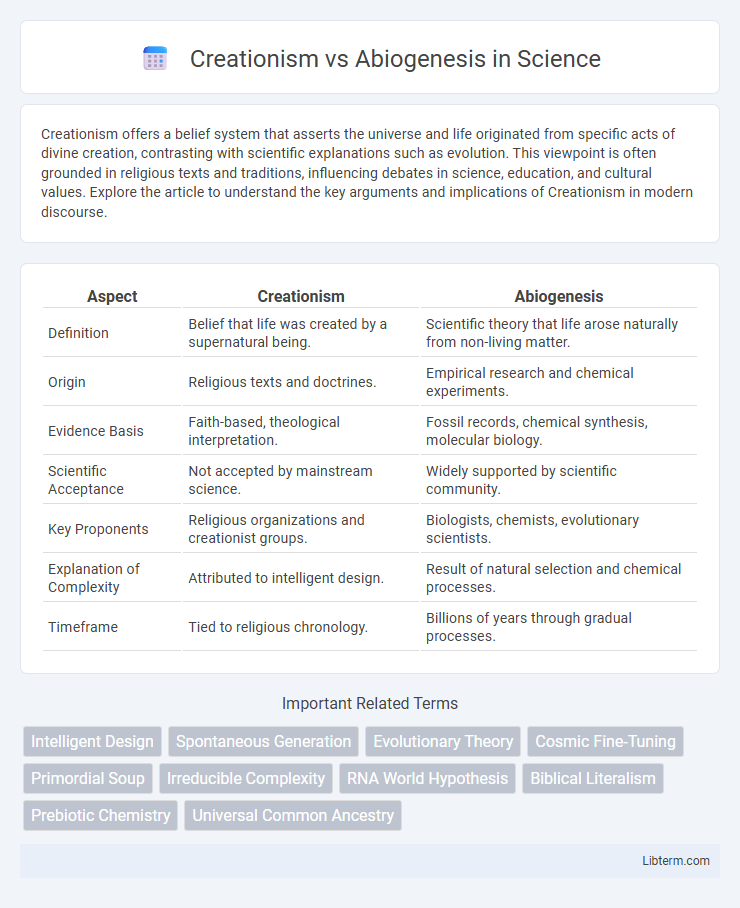Creationism offers a belief system that asserts the universe and life originated from specific acts of divine creation, contrasting with scientific explanations such as evolution. This viewpoint is often grounded in religious texts and traditions, influencing debates in science, education, and cultural values. Explore the article to understand the key arguments and implications of Creationism in modern discourse.
Table of Comparison
| Aspect | Creationism | Abiogenesis |
|---|---|---|
| Definition | Belief that life was created by a supernatural being. | Scientific theory that life arose naturally from non-living matter. |
| Origin | Religious texts and doctrines. | Empirical research and chemical experiments. |
| Evidence Basis | Faith-based, theological interpretation. | Fossil records, chemical synthesis, molecular biology. |
| Scientific Acceptance | Not accepted by mainstream science. | Widely supported by scientific community. |
| Key Proponents | Religious organizations and creationist groups. | Biologists, chemists, evolutionary scientists. |
| Explanation of Complexity | Attributed to intelligent design. | Result of natural selection and chemical processes. |
| Timeframe | Tied to religious chronology. | Billions of years through gradual processes. |
Introduction to Creationism and Abiogenesis
Creationism asserts that life originated from specific acts of divine creation, often based on religious texts such as the Bible's Genesis account. Abiogenesis, a scientific hypothesis, proposes that life emerged naturally from non-living chemical compounds through gradual processes on early Earth. The debate between Creationism and Abiogenesis centers on contrasting explanations for the origin of life, blending theological beliefs and empirical scientific research.
Historical Perspectives on the Origin of Life
Historical perspectives on the origin of life include creationism, which asserts life was divinely created in its present form, rooted in religious texts and ancient traditions. Abiogenesis proposes life arose naturally from non-living matter through chemical processes, gaining scientific traction in the 19th and 20th centuries with experiments like Miller-Urey. The debate reflects evolving worldviews, intertwining scientific discoveries with cultural and theological interpretations of life's beginnings.
Key Concepts of Creationism
Creationism centers on the belief that a divine being intentionally designed and created life and the universe, emphasizing a literal interpretation of sacred texts like the Bible's Genesis. Central to creationist doctrine are the concepts of intelligent design, the special creation of humans, and the rejection of evolutionary theory as an explanation for the origin of species. This framework asserts that life exhibits complexity and purpose that cannot be adequately explained by naturalistic processes such as abiogenesis or random mutation.
Fundamental Principles of Abiogenesis
Abiogenesis is the scientific theory that life originated from non-living chemical substances through natural processes on early Earth. Fundamental principles of abiogenesis include chemical evolution, where simple molecules gradually form complex organic compounds, and the formation of self-replicating molecules like RNA, which are essential for the development of primitive life forms. This theory relies on evidence from geology, chemistry, and molecular biology to explain the natural emergence of life without supernatural intervention.
Scientific Evidence Supporting Abiogenesis
Abiogenesis is supported by extensive scientific evidence from fields such as chemistry, geology, and molecular biology, demonstrating how simple organic molecules can evolve into complex life forms under early Earth conditions. Laboratory experiments, including the famous Miller-Urey experiment, have replicated prebiotic synthesis of amino acids, essential for life. Geological records and isotopic data further support the timeline and environmental conditions favorable to abiogenesis, contrasting the creationist perspective that lacks empirical support.
Philosophical and Religious Arguments for Creationism
Philosophical and religious arguments for Creationism emphasize the existence of a purposeful Designer who imparts meaning and complexity to life, contending that the intricate order observed in the universe cannot arise from random, natural processes. Central to these arguments is the teleological perspective, which interprets natural phenomena as evidence of intentional creation rather than chance, often supported by scriptural texts that affirm a divine origin of life and humanity. Creationism also posits that metaphysical principles and moral values are grounded in a transcendent Creator, reinforcing the belief that life's origin is best explained through supernatural intervention rather than abiogenesis.
Major Debates: Science vs. Faith
Creationism asserts that life originated from divine design, emphasizing literal interpretations of religious texts, while abiogenesis proposes that life emerged naturally from non-living matter through chemical processes supported by evidence from evolutionary biology and chemistry. Major debates focus on the differing epistemologies: faith-based belief relying on religious doctrine versus scientific methodology grounded in empirical observation and testable hypotheses. The conflict often centers on educational curricula, where proponents of creationism advocate for inclusion of intelligent design concepts, and scientists argue for teaching evolution and abiogenesis as established scientific theories.
Influential Figures and Key Theories
Creationism is championed by figures such as William Paley, known for the Watchmaker analogy, and modern proponents like Ken Ham who emphasize the literal interpretation of the Bible's Genesis account. Abiogenesis is supported by scientists including Alexander Oparin, who proposed the primordial soup theory, and Stanley Miller, whose famous experiment demonstrated the synthesis of organic compounds under early Earth conditions. The key theories contrast the belief in a divine origin of life with naturalistic processes explaining life's emergence from non-living matter.
Educational and Societal Impacts
Creationism and abiogenesis influence education and society by shaping curricular content and public understanding of origins; creationism often aligns with religious perspectives promoting faith-based explanations, while abiogenesis relies on scientific evidence for life's emergence from non-living matter. Schools incorporating creationism may face conflicts with established scientific standards, impacting science literacy and critical thinking skills. Societally, debates between these viewpoints affect cultural values, acceptance of science, and policy decisions on science education.
Conclusion: Future Directions in the Origin of Life Research
Future directions in origin of life research emphasize interdisciplinary approaches combining molecular biology, geology, and chemistry to unravel prebiotic processes. Advances in synthetic biology and computational modeling aim to simulate early Earth conditions, providing empirical data to test hypotheses about abiogenesis. Ongoing debates between creationism and abiogenesis highlight the need for robust scientific evidence to clarify life's emergence while acknowledging philosophical perspectives.
Creationism Infographic

 libterm.com
libterm.com